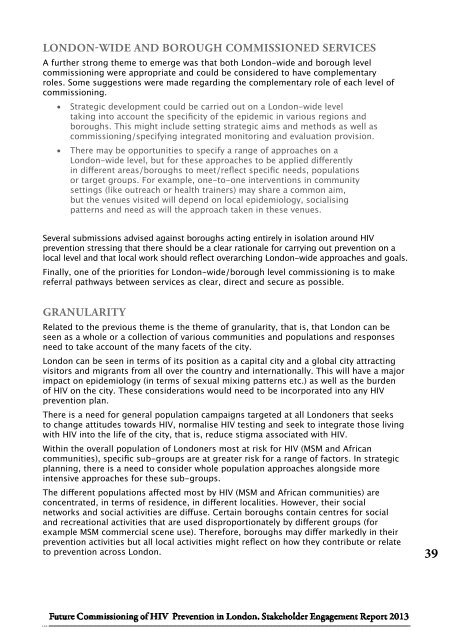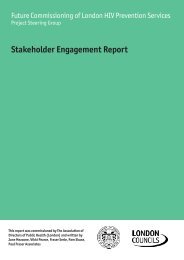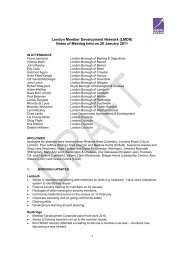Stakeholder Engagement Report - London Councils
Stakeholder Engagement Report - London Councils
Stakeholder Engagement Report - London Councils
Create successful ePaper yourself
Turn your PDF publications into a flip-book with our unique Google optimized e-Paper software.
<strong>London</strong>-wide AND Borough commissioned services<br />
A further strong theme to emerge was that both <strong>London</strong>-wide and borough level<br />
commissioning were appropriate and could be considered to have complementary<br />
roles. Some suggestions were made regarding the complementary role of each level of<br />
commissioning.<br />
• Strategic development could be carried out on a <strong>London</strong>-wide level<br />
taking into account the specificity of the epidemic in various regions and<br />
boroughs. This might include setting strategic aims and methods as well as<br />
commissioning/specifying integrated monitoring and evaluation provision.<br />
• There may be opportunities to specify a range of approaches on a<br />
<strong>London</strong>-wide level, but for these approaches to be applied differently<br />
in different areas/boroughs to meet/reflect specific needs, populations<br />
or target groups. For example, one-to-one interventions in community<br />
settings (like outreach or health trainers) may share a common aim,<br />
but the venues visited will depend on local epidemiology, socialising<br />
patterns and need as will the approach taken in these venues.<br />
Several submissions advised against boroughs acting entirely in isolation around HIV<br />
prevention stressing that there should be a clear rationale for carrying out prevention on a<br />
local level and that local work should reflect overarching <strong>London</strong>-wide approaches and goals.<br />
Finally, one of the priorities for <strong>London</strong>-wide/borough level commissioning is to make<br />
referral pathways between services as clear, direct and secure as possible.<br />
Granularity<br />
Related to the previous theme is the theme of granularity, that is, that <strong>London</strong> can be<br />
seen as a whole or a collection of various communities and populations and responses<br />
need to take account of the many facets of the city.<br />
<strong>London</strong> can be seen in terms of its position as a capital city and a global city attracting<br />
visitors and migrants from all over the country and internationally. This will have a major<br />
impact on epidemiology (in terms of sexual mixing patterns etc.) as well as the burden<br />
of HIV on the city. These considerations would need to be incorporated into any HIV<br />
prevention plan.<br />
There is a need for general population campaigns targeted at all <strong>London</strong>ers that seeks<br />
to change attitudes towards HIV, normalise HIV testing and seek to integrate those living<br />
with HIV into the life of the city, that is, reduce stigma associated with HIV.<br />
Within the overall population of <strong>London</strong>ers most at risk for HIV (MSM and African<br />
communities), specific sub-groups are at greater risk for a range of factors. In strategic<br />
planning, there is a need to consider whole population approaches alongside more<br />
intensive approaches for these sub-groups.<br />
The different populations affected most by HIV (MSM and African communities) are<br />
concentrated, in terms of residence, in different localities. However, their social<br />
networks and social activities are diffuse. Certain boroughs contain centres for social<br />
and recreational activities that are used disproportionately by different groups (for<br />
example MSM commercial scene use). Therefore, boroughs may differ markedly in their<br />
prevention activities but all local activities might reflect on how they contribute or relate<br />
to prevention across <strong>London</strong>.<br />
39




